In today’s rapidly evolving business landscape, startups face the constant challenge of staying ahead of the competition. To drive innovation and gain a competitive edge, startups need to leverage the power of custom software development. This article explores the top startup industries that can greatly benefit from custom software solutions, revolutionizing their operations and propelling them towards success.
Custom software development refers to the process of designing, creating, and implementing software solutions tailored specifically to meet the unique needs of a business or industry. Unlike off-the-shelf software, custom software is developed from scratch and can be fully customized to address specific challenges, streamline processes, and deliver a superior user experience. By harnessing the capabilities of custom software, startups can unlock unparalleled opportunities for growth and innovation.
Innovation lies at the heart of startup success. Startups thrive by offering new and groundbreaking solutions that disrupt traditional industries, challenge the status quo, and meet the evolving demands of customers. By embracing innovation, startups can unlock new revenue streams, attract investors, and establish a strong market presence. Custom software development plays a pivotal role in fostering innovation by enabling startups to create unique, technology-driven solutions that address industry pain points, enhance efficiency, and provide a seamless user experience.
The purpose of this article is to shed light on the top startup industries that stand to benefit greatly from custom software development. By exploring each industry’s unique challenges and opportunities, we will delve into how custom software solutions can empower startups to overcome obstacles, drive innovation, and achieve sustainable growth. From healthcare and FinTech to e-commerce and EdTech, we will highlight the diverse range of industries where custom software can be a game-changer for startups. By the end of this article, readers will gain insights into the immense potential custom software holds for startups and understand how it can be leveraged to unleash innovation and create a lasting impact in the chosen industries.
Top 10 Startup Industries that Benefit from Custom Software Development
The startup landscape is constantly evolving, and numerous industries can benefit from custom software development to drive innovation and gain a competitive edge.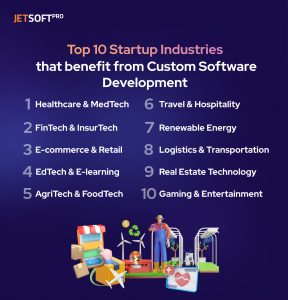
Here are the top 10 startup industries that can greatly benefit from leveraging custom software solutions:
1. Healthcare and MedTech
With the increasing demand for efficient healthcare services and technological advancements, startups in this sector can benefit from custom software development to create electronic health records (EHR) systems, telemedicine platforms, medical device software, and health monitoring applications.
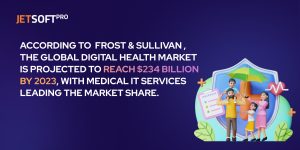
Benefits:
- Increased Efficiency and Productivity
Custom software development enables healthcare providers and MedTech companies to automate routine tasks, reduce manual errors, and enhance overall efficiency. By developing software solutions that are specifically designed to meet their workflow requirements, organizations can streamline processes such as patient registration, appointment scheduling, electronic health records (EHR), billing, and inventory management. Automation not only saves time but also reduces the risk of errors, allowing healthcare professionals to focus on delivering quality care to patients.
- Enhanced Data Management and Security
Data security and privacy are critical concerns in healthcare. Custom software development allows healthcare providers to build robust systems that adhere to the highest security standards and comply with regulations such as HIPAA (Health Insurance Portability and Accountability Act). Custom software can encrypt patient data, restrict access to authorized personnel, and provide audit trails for tracking data breaches. Additionally, custom software solutions enable seamless integration with existing healthcare systems, ensuring efficient data management and facilitating data-driven decision-making.
- Improved Patient Care and Engagement
Custom software development empowers healthcare providers to deliver personalized care and improve patient engagement. Through patient portals and mobile applications, patients can access their health records, schedule appointments, receive test results, and communicate with their healthcare providers conveniently. Custom software solutions can also incorporate patient monitoring devices, wearables, and telemedicine features, enabling remote patient monitoring, virtual consultations, and real-time data analysis. These advancements enhance patient satisfaction, reduce wait times, and enable proactive healthcare interventions.
- Streamlined Collaboration and Communication
Efficient collaboration and communication among healthcare professionals are essential for delivering optimal patient care. Custom software development can create communication platforms that facilitate seamless information sharing, enabling healthcare providers to collaborate effectively. For example, custom software can integrate with existing communication systems to enable secure messaging, video conferencing, and file sharing. Such platforms foster interdisciplinary collaboration, leading to better coordination and faster decision-making.
- Scalability and Flexibility
Custom software solutions are designed to be scalable and flexible, accommodating the evolving needs of healthcare organizations and MedTech companies. As technology advances and healthcare requirements change, custom software can be easily adapted and upgraded to incorporate new functionalities. This scalability ensures that healthcare providers can meet the growing demands of their patient population while staying at the forefront of technological innovations. Additionally, custom software development allows organizations to integrate with third-party systems and leverage emerging technologies such as artificial intelligence (AI) and machine learning (ML) to enhance diagnostics, predictive analytics, and treatment planning.
Feel free to explore JetSoftPro’s previous blog article titled ” The most wanted health devices of next years ” to delve deeper into recent trends in Healthcare and MedTech.
2. FinTech and InsurTech
The financial and insurance sectors are undergoing significant disruption, making it crucial for startups to leverage custom software development for creating innovative payment solutions, mobile banking apps, peer-to-peer lending platforms, robo-advisory services, and insurance claim management systems.

Benefits:
- Enhanced Efficiency and Automation
Custom software development offers FinTech and InsurTech companies the opportunity to automate manual and time-consuming processes, thereby increasing overall efficiency. By developing software solutions tailored to their unique requirements, these organizations can streamline operations such as customer onboarding, loan origination, underwriting, claims processing, and risk assessment. Automation reduces human errors, speeds up processes, and frees up valuable resources, enabling companies to focus on value-added tasks and provide faster, more accurate services to customers.
- Improved Security and Compliance
Security and compliance are paramount in the financial and insurance sectors. Custom software development allows companies to build robust systems that adhere to the highest security standards and comply with industry regulations, such as PCI DSS (Payment Card Industry Data Security Standard) and GDPR (General Data Protection Regulation). Custom software solutions can incorporate advanced security features like encryption, secure authentication, and access controls to protect sensitive customer data and prevent unauthorized access. Moreover, custom software enables companies to quickly adapt to changing regulations, ensuring ongoing compliance and mitigating legal and reputational risks.
- Personalized Customer Experiences
In the digital age, customer experience is a key differentiator for FinTech and InsurTech companies. Custom software development enables these organizations to create personalized experiences for their customers, enhancing engagement and loyalty. Custom software solutions can incorporate customer relationship management (CRM) tools, data analytics, and machine learning algorithms to gather and analyze customer data. This data-driven approach allows companies to offer tailored financial or insurance products, personalized recommendations, and targeted marketing campaigns that resonate with individual customers’ needs and preferences.
- Seamless Integration and Scalability
FinTech and InsurTech companies often need to integrate with various third-party systems, such as payment gateways, banking APIs, and data aggregators. Custom software development enables seamless integration, ensuring smooth data exchange and interoperability between different systems. Furthermore, custom software solutions are scalable, allowing companies to handle growing volumes of transactions, customer data, and user traffic without compromising performance. Scalability ensures that companies can adapt to changing market demands, expand their offerings, and support business growth effectively.
- Data Analytics and Insights
Data is a valuable asset for FinTech and InsurTech companies. Custom software development equips these organizations with the ability to collect, analyze, and derive actionable insights from large volumes of data. By leveraging data analytics and visualization tools, companies can gain a deeper understanding of customer behavior, market trends, and risk patterns. This information can drive data-driven decision-making, product innovation, risk management, fraud detection, and personalized pricing strategies. Ultimately, harnessing data analytics empowers companies to stay competitive, make informed decisions, and deliver better outcomes for their customers.
3. E-commerce and Retail
The e-commerce and retail industries are highly competitive, and startups can differentiate themselves by utilizing custom software solutions to build personalized shopping experiences, inventory management systems, supply chain optimization tools, and customer relationship management (CRM) platforms.
Benefits:
- Improved Efficiency and Automation
Custom software development allows e-commerce and retail businesses to optimize their operations and automate repetitive tasks, resulting in improved efficiency. By developing software solutions tailored to their specific requirements, companies can automate processes such as inventory management, order fulfillment, shipping, and customer support. Automation reduces manual errors, saves time, and enables businesses to handle larger volumes of orders effectively. This enhanced efficiency translates into faster order processing, shorter lead times, and improved customer satisfaction.
- Seamless Integration and Omnichannel Experience
Custom software solutions facilitate seamless integration between various systems and channels, enabling businesses to offer a seamless omnichannel experience. E-commerce and retail companies often operate through multiple sales channels, including websites, mobile apps, brick-and-mortar stores, and marketplaces. Custom software development ensures smooth data synchronization and real-time inventory updates across all channels, allowing customers to browse, purchase, and return products seamlessly. This integrated approach enhances customer convenience and fosters brand loyalty.
- Personalized Customer Engagement
Custom software development empowers e-commerce and retail businesses to deliver personalized customer experiences, leading to increased customer engagement and conversions. Through features like customer relationship management (CRM) tools and data analytics, businesses can gather and analyze customer data to understand preferences, purchase history, and browsing behavior. This data-driven approach enables targeted marketing campaigns, personalized product recommendations, and tailored offers, creating a more personalized shopping experience for customers and driving higher customer loyalty and satisfaction.
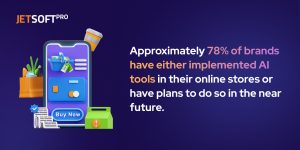
- Enhanced Data Analytics and Insights
Data is a valuable asset for e-commerce and retail businesses. Custom software development equips companies with advanced data analytics capabilities to derive actionable insights from large volumes of customer and sales data. By leveraging data analytics tools, businesses can identify trends, monitor sales performance, optimize pricing strategies, and make informed decisions about inventory management and product assortment. Data-driven insights enable businesses to stay agile, respond to market demands effectively, and gain a competitive edge.
- Scalability and Flexibility
E-commerce and retail businesses experience fluctuations in demand throughout the year, especially during peak seasons or promotional campaigns. Custom software solutions are designed to be scalable and flexible, allowing businesses to handle sudden increases in website traffic, order volumes, and customer inquiries without disruptions. Custom software development enables businesses to scale their infrastructure, add new features, and adapt to evolving market demands swiftly. This scalability ensures that businesses can seize growth opportunities and provide seamless experiences to customers, regardless of the scale of their operations.
4. EdTech and E-learning
As education and learning move towards digital platforms, startups in the EdTech sector can leverage custom software development to build interactive e-learning platforms, virtual classrooms, learning management systems (LMS), personalized learning apps, and educational content management systems.
Benefits:
- Personalized Learning Experiences
Custom software development enables EdTech and e-learning platforms to deliver personalized learning experiences that cater to the unique needs and learning styles of individual students. By leveraging data analytics and artificial intelligence, custom software solutions can assess students’ strengths, weaknesses, and preferences, allowing for adaptive learning pathways. These platforms can offer customized content, interactive modules, and personalized assessments, ensuring that students receive tailored instruction and support, resulting in improved engagement and learning outcomes.
- Enhanced Accessibility and Inclusivity
Custom software development has made education more accessible and inclusive than ever before. It has opened up opportunities for learners who may face physical or geographical barriers to traditional education. Custom e-learning platforms can incorporate features such as closed captioning, text-to-speech functionality, and compatibility with assistive technologies, ensuring that learners with disabilities can fully participate in online courses. Additionally, custom software solutions can offer multilingual interfaces and translations, making education accessible to a global audience.
- Interactive and Engaging Learning Content
Custom software development enables the creation of interactive and engaging learning content, making the educational experience more immersive and enjoyable for students. Custom e-learning platforms can incorporate multimedia elements such as videos, animations, gamification, and virtual reality (VR) simulations. These features not only capture students’ attention but also facilitate active participation, knowledge retention, and practical application of concepts. Interactive learning content promotes critical thinking, problem-solving skills, and collaborative learning, fostering a dynamic and engaging learning environment.
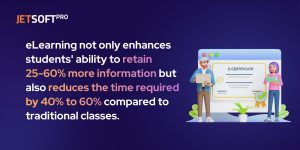
- Efficient Learning Management Systems
Custom software development empowers EdTech platforms to develop efficient learning management systems (LMS) that streamline administrative tasks, simplify course management, and enhance communication between educators and learners. Custom LMS solutions can automate processes such as enrollment, grading, attendance tracking, and content distribution. They can also provide collaborative features like discussion forums, live chats, and virtual classrooms, enabling seamless interaction and feedback exchange. These systems optimize administrative workflows, saving time and resources for educators while providing a seamless learning experience for students.
- Data-Driven Insights for Educators
Custom software solutions offer educators valuable insights into student performance, learning patterns, and progress. Through data analytics and reporting tools, custom software development enables the collection and analysis of student data, providing educators with actionable insights. Educators can identify areas where students may need additional support, track their progress over time, and tailor instruction accordingly. Data-driven insights help educators make informed decisions, design targeted interventions, and personalize their teaching strategies to maximize student success.
5. AgriTech and FoodTech
The agriculture and food industries are undergoing digital transformation, and startups can benefit from custom software development by creating precision farming solutions, crop monitoring systems, supply chain management platforms, food traceability apps, and farm management software.
Benefits:
- Precision Farming and Crop Management
Custom software development enables precision farming practices by leveraging technologies such as Internet of Things (IoT), sensors, and data analytics. Farmers can collect real-time data on soil moisture, temperature, and nutrient levels, enabling precise irrigation, fertilization, and pest control. Custom software solutions can analyze this data, providing farmers with actionable insights to optimize crop management strategies, increase yields, and reduce resource wastage. Precision farming not only enhances productivity but also promotes sustainable agricultural practices and minimizes environmental impact.
- Supply Chain Optimization
Custom software development allows AgriTech and FoodTech companies to optimize supply chain operations, leading to improved efficiency and reduced costs. Custom software solutions can track and manage inventory, monitor transportation logistics, and facilitate seamless communication between farmers, suppliers, distributors, and retailers. These solutions enable real-time visibility into the supply chain, minimizing delays, reducing wastage, and ensuring that fresh produce reaches consumers in a timely manner. Supply chain optimization enhances transparency, quality control, and customer satisfaction.
- Quality Control and Food Safety
Custom software development plays a vital role in ensuring food safety and quality control throughout the entire production and distribution process. Custom software solutions can track and trace products, capturing data on each stage of the supply chain, including cultivation, harvesting, processing, packaging, and distribution. This information enables efficient recall management, identifies potential contamination sources, and ensures compliance with regulatory standards. Custom software can also implement quality control measures such as real-time monitoring, certification management, and predictive analytics to prevent foodborne illnesses and maintain product quality.
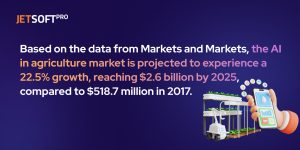
- Market Access and Consumer Engagement
Custom software development enables AgriTech and FoodTech companies to connect directly with consumers, fostering market access and consumer engagement. Custom software solutions can create e-commerce platforms, mobile applications, or online marketplaces that facilitate direct sales and enable farmers to reach a broader customer base. These platforms can provide information about product origin, farming practices, nutritional value, and recipe suggestions, empowering consumers to make informed purchasing decisions. Custom software solutions also facilitate direct communication and feedback exchange between farmers and consumers, strengthening consumer trust and loyalty.
- Data-Driven Decision-Making
Custom software development equips AgriTech and FoodTech companies with data-driven insights for informed decision-making. By integrating data analytics and machine learning algorithms, custom software solutions can analyze large volumes of agricultural and consumer data. These insights can inform strategic planning, optimize resource allocation, predict market trends, and guide product development. Data-driven decision-making enables AgriTech and FoodTech companies to stay competitive, adapt to changing consumer preferences, and drive innovation in the industry.
6. Travel and Hospitality
Startups in the travel and hospitality industry can enhance customer experiences and streamline operations through custom software development. This includes building hotel booking platforms, travel itinerary management systems, property management software, and AI-powered chatbots for customer support.
Benefits:
- Streamlined Operations and Efficiency
Custom software development allows travel and hospitality businesses to optimize their operations and improve efficiency by automating manual processes. Custom software solutions can be tailored to handle tasks such as online bookings, reservations, inventory management, and resource allocation. Automation reduces human errors, saves time, and enables businesses to handle a large volume of transactions smoothly. By streamlining operations, custom software development enhances productivity, reduces costs, and allows businesses to focus on delivering exceptional experiences to their customers.
- Enhanced Customer Experience and Personalization
Custom software development enables travel and hospitality businesses to provide personalized experiences to their customers. Custom software solutions can incorporate customer relationship management (CRM) tools, data analytics, and artificial intelligence to gather and analyze customer data. This data-driven approach allows businesses to offer personalized recommendations, customized travel itineraries, targeted marketing campaigns, and seamless communication throughout the customer journey. Personalization enhances customer satisfaction, fosters loyalty, and differentiates businesses in a crowded marketplace.
- Seamless Integration and Connectivity
Custom software development enables seamless integration and connectivity across various platforms and systems in the travel and hospitality industry. Custom software solutions can integrate with third-party systems, such as airline booking engines, hotel property management systems, payment gateways, and transportation services. This integration facilitates real-time data exchange, automates processes, and ensures a seamless experience for both businesses and customers. Seamless connectivity allows for efficient collaboration between different stakeholders, streamlines operations, and improves overall customer satisfaction.
- Improved Revenue Management and Pricing Strategies
Custom software development empowers travel and hospitality businesses to optimize revenue management and pricing strategies. Custom software solutions can incorporate advanced analytics and forecasting algorithms to analyze market demand, competitor pricing, and customer booking patterns. This data-driven approach enables businesses to adjust prices dynamically, offer personalized discounts, and maximize revenue through yield management. By optimizing revenue management, businesses can increase profitability, make data-driven pricing decisions, and adapt to market fluctuations.
- Enhanced Safety and Security
Custom software development plays a critical role in ensuring safety and security in the travel and hospitality industries. Custom software solutions can integrate security features such as secure payment gateways, encryption, and authentication protocols to protect customer data and prevent unauthorized access. Additionally, custom software can facilitate contactless check-ins, digital health passports, and safety protocols compliance, promoting health and safety in the post-pandemic era. Enhanced safety and security measures build trust among customers, increase brand reputation, and encourage repeat business.
7. Renewable Energy
Custom software development can help startups in the renewable energy sector by creating energy management systems, smart grid solutions, predictive maintenance software, and data analytics platforms to optimize energy generation and distribution.
Benefits:
- Improved Energy System Monitoring and Control
Custom software development allows for real-time monitoring and control of renewable energy systems. Through the integration of sensors, IoT devices, and data analytics, custom software solutions provide detailed insights into the performance and condition of renewable energy assets. This enables operators to monitor power generation, detect anomalies or malfunctions, and optimize system performance. Real-time data empowers decision-makers to proactively address issues, minimize downtime, and maximize energy production, leading to increased overall system efficiency.
- Enhanced Resource Assessment and Forecasting
Custom software development enables accurate resource assessment and forecasting for renewable energy projects. By integrating meteorological data, historical patterns, and machine learning algorithms, custom software solutions can predict renewable energy resources such as solar radiation, wind speed, or hydrological conditions. This information helps developers identify optimal locations for renewable energy installations, optimize energy production, and plan for future energy demand. Accurate resource assessment and forecasting enable efficient project planning, reduce uncertainty, and improve project viability.
- Optimal Energy Grid Integration
Custom software development facilitates the integration of renewable energy systems with existing power grids. Custom software solutions can manage the complex interactions between various renewable energy sources, energy storage systems, and the grid infrastructure. This integration enables efficient energy flow, load balancing, and grid stability. Custom software can also incorporate demand response mechanisms, allowing renewable energy producers to respond to grid conditions and participate in energy trading or ancillary services. Seamless grid integration promotes a reliable and resilient renewable energy ecosystem.
- Data Analytics and Performance Optimization
Custom software development enables data analytics and performance optimization for renewable energy assets. By analyzing large volumes of data, custom software solutions can identify performance trends, detect inefficiencies, and provide insights to improve system performance. Data-driven optimization helps operators maximize energy production, minimize maintenance costs, and extend the lifespan of renewable energy assets. Custom software can also facilitate predictive maintenance, enabling proactive interventions to prevent equipment failures and optimize asset performance.
- Remote Monitoring and Management
Custom software development allows for remote monitoring and management of renewable energy systems, improving operational efficiency and reducing costs. Custom software solutions can provide remote access to monitoring dashboards, control panels, and performance data. This remote management capability enables operators to monitor and control renewable energy assets from any location, reducing the need for physical presence and on-site visits. Remote monitoring and management enhance operational flexibility, minimize downtime, and optimize resource allocation.
8. Logistics and Transportation
With the growth of e-commerce and global trade, startups in logistics and transportation can benefit from custom software solutions such as fleet management systems, route optimization software, real-time tracking applications, and supply chain visibility platforms.

Benefits:
- Efficient Supply Chain Management
Custom software development enables logistics and transportation companies to streamline their supply chain operations. Custom software solutions can automate and integrate processes such as inventory management, order fulfillment, and demand forecasting. This automation reduces manual errors, minimizes lead times, and optimizes inventory levels. Real-time visibility into the supply chain allows for proactive decision-making, efficient resource allocation, and effective coordination between different stakeholders, ultimately improving the overall efficiency and responsiveness of the supply chain.
- Route Optimization and Fleet Management
Custom software development empowers logistics and transportation companies to optimize routes and efficiently manage their fleets. Custom software solutions can leverage algorithms and data analytics to consider factors such as traffic conditions, vehicle capacity, delivery time windows, and fuel consumption. By analyzing these variables, custom software can generate optimal routes, assign resources, and improve overall fleet utilization. Route optimization and fleet management solutions reduce fuel costs, enhance on-time delivery rates, and improve customer satisfaction.
- Real-Time Tracking and Visibility
Custom software development allows for real-time tracking and visibility of shipments and assets throughout the transportation process. Custom software solutions can integrate GPS, RFID, and other tracking technologies to provide real-time updates on the location, status, and condition of goods. This visibility enables logistics companies and their customers to track shipments, monitor delivery progress, and proactively address any potential issues or delays. Real-time tracking and visibility improve operational efficiency, reduce the risk of lost or misplaced shipments, and enhance customer trust and satisfaction.
- Warehouse Management and Automation
Custom software development facilitates efficient warehouse management and automation. Custom software solutions can optimize inventory management, automate picking and packing processes, and streamline warehouse operations. By integrating with technologies such as barcode scanners, robotics, and IoT devices, custom software enables real-time inventory tracking, efficient order fulfillment, and improved labor productivity. Warehouse automation reduces errors, increases order accuracy, and accelerates order processing times, ultimately improving the overall operational efficiency of logistics companies.
- Data Analytics and Business Intelligence
Custom software development empowers logistics and transportation companies to harness the power of data analytics and business intelligence. Custom software solutions can collect, analyze, and visualize data from various sources, such as transportation routes, delivery performance, customer feedback, and market trends. This data-driven approach provides valuable insights for decision-making, enabling companies to optimize routes, improve operational efficiency, identify cost-saving opportunities, and make data-driven business decisions. Data analytics and business intelligence solutions enhance operational visibility, facilitate continuous improvement, and drive business growth.
9. Real Estate Technology
Startups in the real estate industry can leverage custom software development to create property management systems, real estate marketplaces, virtual property tours, lease management platforms, and smart home automation solutions.
Benefits:
- Enhanced Property Search and Listing Management
Custom software development enables real estate companies to offer advanced property search functionalities and efficient listing management. Custom software solutions can incorporate intelligent search algorithms, customizable filters, and interactive maps to help buyers and tenants find properties that meet their specific criteria. Additionally, custom software allows for seamless listing management, enabling agents to update property details, upload images, and track inquiries in real-time. Enhanced property search and listing management capabilities attract more potential buyers or tenants, increase lead generation, and improve overall customer satisfaction.
- Automated Workflow and Transaction Management
Custom software development automates key workflows and transaction management processes in the real estate industry. Custom software solutions can streamline tasks such as document management, contract generation, electronic signatures, and transaction tracking. Automation reduces manual errors, eliminates paperwork, and accelerates the time-consuming aspects of real estate transactions. Custom software also enables secure storage and retrieval of transaction-related documents, ensuring compliance with legal and regulatory requirements. Automated workflow and transaction management enhance operational efficiency, reduce administrative burden, and enable agents to focus on building client relationships.
- Customer Relationship Management (CRM) and Lead Nurturing
Custom software development facilitates effective customer relationship management and lead nurturing in the real estate industry. Custom CRM solutions can centralize customer data, track interactions, and automate follow-up processes. By integrating with marketing automation tools, custom software enables personalized communication, targeted email campaigns, and lead scoring based on user behavior. This helps real estate professionals nurture leads, increase conversions, and build long-term relationships with clients. Effective CRM and lead nurturing improve customer satisfaction, increase repeat business, and drive referrals.
- Data Analytics and Market Insights
Custom software development empowers real estate companies to leverage data analytics and gain valuable market insights. Custom software solutions can collect and analyze data on property prices, market trends, demographic information, and customer preferences. This data-driven approach enables real estate professionals to make informed decisions, identify investment opportunities, and devise effective marketing strategies. Custom software can provide interactive dashboards and visualizations, allowing for a comprehensive view of the real estate market. Data analytics and market insights drive competitive advantage, enable proactive decision-making, and support growth in the real estate industry.
- Property Management and Maintenance
Custom software development enables efficient property management and maintenance processes. Custom software solutions can automate tasks such as rent collection, lease renewals, maintenance requests, and vendor management. By centralizing these processes in a single platform, custom software improves communication, reduces manual errors, and enhances overall property management efficiency. Custom software can also incorporate predictive maintenance algorithms and IoT integration to monitor property conditions, identify maintenance needs, and proactively address potential issues. Effective property management and maintenance enhance tenant satisfaction, minimize vacancies, and maximize property value.
10. Gaming and Entertainment
The gaming and entertainment industry is thriving, and startups can utilize custom software development to build immersive gaming experiences, virtual reality (VR) applications, augmented reality (AR) games, content streaming platforms, and online ticketing systems.

Benefits:
- Tailored Game Development
Custom software development enables game developers to create unique and tailored gaming experiences. Custom software solutions provide developers with the flexibility to design games from scratch, incorporating specific features, mechanics, and visual elements to match their creative vision. By leveraging custom software, developers can push the boundaries of innovation, introducing new gameplay mechanics, realistic graphics, and immersive virtual worlds. The ability to tailor game development allows for the creation of engaging and differentiated gaming experiences that captivate players and keep them coming back for more.
- Improved Game Performance and Optimization
Custom software development allows for optimized game performance and enhanced player experiences. Custom software solutions can be designed to utilize hardware resources efficiently, optimize game engine performance, and minimize loading times. Additionally, custom software can incorporate advanced graphics rendering techniques, physics simulations, and artificial intelligence algorithms, resulting in smoother gameplay, realistic visuals, and immersive environments. Improved game performance not only enhances player satisfaction but also contributes to longer play sessions and increased player retention.
- Multi-platform Compatibility
Custom software development enables gaming and entertainment companies to reach a broader audience by ensuring multi-platform compatibility. Custom software solutions can be designed to support various platforms such as consoles, PCs, mobile devices, and virtual reality systems. This allows games to be accessible to players across different devices, expanding the potential player base and increasing market reach. By leveraging custom software development, gaming companies can adapt to the preferences and behaviors of diverse audiences, fostering greater engagement and revenue opportunities.
- Advanced Player Engagement and Monetization
Custom software development empowers gaming and entertainment companies to enhance player engagement and monetization strategies. Custom software solutions can incorporate player analytics, social integration features, and in-game economy systems to personalize player experiences, encourage social interactions, and drive player progression. Custom software can also facilitate the implementation of monetization models, such as in-app purchases, subscriptions, and advertising integration. By leveraging custom software, companies can create engaging experiences that keep players invested, while also generating revenue through various monetization channels.
- Efficient Game Distribution and Management
Custom software development streamlines the game distribution and management processes. Custom software solutions can incorporate content management systems, digital distribution platforms, and user management functionalities. This enables companies to efficiently distribute games, manage updates, and engage with players through community forums, customer support, and feedback channels. Custom software can also integrate anti-piracy measures and secure payment gateways, protecting intellectual property and ensuring fair compensation for game developers. Efficient game distribution and management systems simplify operations, reduce costs, and provide a seamless experience for both developers and players.

